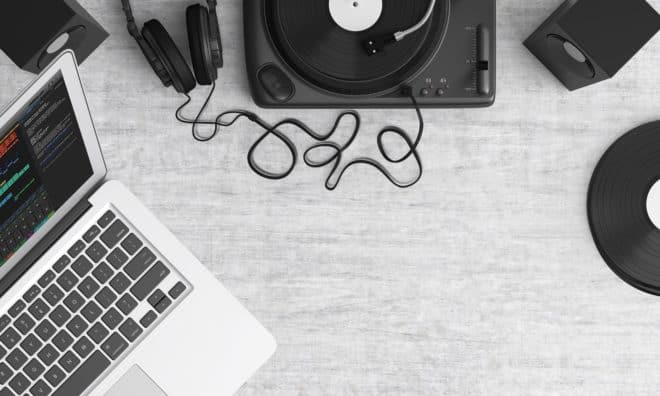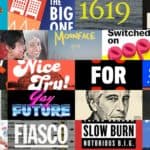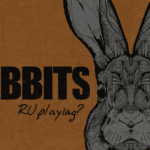Q&A with “Switched On Pop” co-host Charlie Harding

Charlie Harding, co-host of the Switched On Pop podcast along with musicologist Nate Sloan, is just starting his car when I call him to do this interview.
“I just finished editing the latest episode,” Charlie says, his voice vibrant and full of energy despite a long day of producing the episode “The Shifting Sound of R&B.”
“Charlie, I’m sorry to get you after a long day,” I say in a contrite voice.
“No problem,” Charlie dismisses my penitence. “I’m done for the day and I love talking about music.”
That’s the essence of talking with Charlie Harding about music. He loves it and he can do it for long stretches without quenching his intellectual curiosity for understanding how music works organically, how it affects us culturally and why it can impact us individually.
Related reading: Switched On Pop: a podcast that’s music to your ears
What becomes abundantly clear during our interview is that Charlie Harding wants us – his listeners – to appreciate the sonic artistry of all kinds of music from classical to hip hop. For Harding and Sloan, no component of music is too insignificant to mention, so we are treated, for example, to a discussion of the virtues of hand claps on the July 2018 episode on the Beach Boys’ 1964 summer hit “I Get Around.”
Gems of sonic discovery are ubiquitous in every Switched On Pop episode. Unlike other podcasts where the podcast host or hosts are the all-knowing experts dispensing low-carb morsels of knowledge, Harding and Sloan delight the listener with a radically different strategy. In most episodes, either Harding or Sloan acts as the listener, asking questions, connecting bits of musical insights into a coherent whole. For example, in the episode “Why is 90s music so weird?” Sloan takes Harding down a checkered path to understand the history of the 90s hit Cotton Eye Joe, which is replete with tales of racial stereotyping, copyright wars and cultural appropriation.
Discover Pods: How did you hook up with Nate Sloan?
Harding: Nate and I met in college taking music courses together. In an orchestration class actually. Nate and I had a mutual friend who was a bass player and he brought us together for a blue grass band, all playing our secondary and tertiary instruments. It was a blast but that band broke up because I was moving to New York and Nate was moving to LA. But we continued our musical relationship and we began the show in 2014 and did it for four years when we lived on opposite coasts, even though that wasn’t obvious to the listeners.
Nate and I share a passion for music, music education and music journalism that thinks first about what the music has to say composition-ally. We had a sincere interest in getting out of a raucous, art music snobbery and opening our ears to the fact there is not just one way to listen to music and that pop music plays an important cultural role and holds important musical lessons to our listeners. We wanted to answer the music fan’s question about why the ear worms we’re listening to are just stuck in our head.
NOTE: Since last August, Nate and Charlie both live in the LA area.
Discover Pods: Each of you seem to take the lead on different episodes. How did that evolve?
Harding: The way that we produce the show is inspired by Tim Howard from RadioLab and then Reply All. He has createda unique mix of extemporaneous, real and joyful conversation that’s going somewhere. In our episodes, we wanted to have one of us act as the producer of the show and other is there to stand in for the listener.
For example, I just did an episode about contemporary R&B so I said to Nate before the episode that I wanted him to listen to this particular piece so it’s in his ear before we do the episode.
As a proxy for the listener, I want Nate to refute me and challenge me and you can get a conversation with directional arc but also has a lot of extemporaneousness to it.
The show is an ever-changing format. Sometimes it’s a conversation with an artist. Sometimes it’s just a conversation between me and Nate.
One challenge we have is that we are trying to serve a general audience. Nate and I are music nerds. We would love to discuss modal counterpoint and harmonic progressions but we want to serve that general audience. There is a demand for that musical depth of knowledge with, for example, Adam Neely’s YouTube channel.
We have a lot of musicians listen and we think they still enjoy the show because it’s not music theory 101 but applying new ways to listen to music.
Discover Pods What’s the process for developing episode topics? How do you decide on your guests? How did you hook up with Chris Molanphy and guest-host on Slate Hit Parade?
Harding: The number of people doing music podcasts is a fairly small group. I was just hanging out with Hrishikesh Hirway from Song Exploder and we’re friends with Nick White who does Lost Notes.
Podcasters enjoy getting together and the industry is collaborative and respectful, less than it is cut throat and partially that is because it’s in a growth cycle. We all benefit from more people listening and it’s not a zero sum game.
With Chris Molanphy, we’ve never met in person. I just reached out to Chris via Twitter and that sparked a connection that led to Nate and I guesting on an episode of Slate Hit Parade. When it comes to chart knowledge, Chris is truly the master.
At Vox, Bridget Armstrong is a fabulous producer with experience in podcasting. Our editor is Brandon McFarland who mixes, matches and edits. It’s a collaborative process.. We talk about what they are listening to. Of course, our most important feedback mechanism is talking to our listeners and they are often on top of things before we are. I’m very lucky I have a great team. Music can be divisive and our team has different tastes but great respect for all kinds of music. We want to constantly challenge what is popular. Not just what’s on the top 100. We try to cover what’s popular in the zeitgeist but not necessarily on the Billboard charts.
Discover Pods: I heard you have a book coming out? Can you give us more information?
A. Harding: Yes in January 2020, it’s called Switched On Pop: How Popular Music Works, and Why it Matters and it will be published by University Press and is currently available for pre-order on Amazon. Should ship in December so it’ll be a great holiday gift.
We wrote this book because we frequently get questions from listeners about how they can listen and think about music like Nate and I do. What class can I take, they often ask.
The book contains 17 songs over the last 20 years and each song pairs with musical concepts from beginner concepts to more complex concepts. If you’re a non-musician you are going to get a sampling of everything from melody, timbre and harmony, plus much more. For anyone who is musically curious, Nate And I think it will be fun and informative.
Discover Pods How did you and Nate through Vox find a niche in the music podcasting space? You have Song Exploder on one hand where artists take apart their own songs and Slate’s Hit Parade that focuses on chart history either from sales or streaming.
Harding: There are other music podcasts but we try to explore new territory. Our strong piece about Despacito and the episode on Lemonade are good examples. In Despacito we discussed how harmony and chord progressions points to an ambiguity of genres and non-binary identity and more accepting forms of identity. That’s something we can find in the music and that’s only because I have a great partner like Nate, who is a musicologist.
People’s relationship to music is often primarily cultural so when we talked about Lemonade, for example, we able to discuss how the specific message of the music harmonized with how the music presented itself.
We are aware that our identity as two white men can affect our coverage. The Meghan Trainor episode was excellent, I thought, because we looked at feminism in popular music and we interviewed experts on the topic. And when we just talked about R&B, we interviewed Oak Felder, one of the biggest producers in R&B, because he’s an expert and he’s lived that music.
Nate’s historical knowledge of popular music and his deep repertoire allows us to look at historical forces that impact the culture.
Discover Pods: How do you and Nate find working at Vox?
Harding: It’s tremendous at Vox. They are a fabulous partner. They’ve taken ownership of the production process. That allows us to do more ambitious work. In our most recent episode I was able to talk with two key expert sources and do more reporting and investigative work and still maintain the essence of the show, which is personality-driven between Nate and I.
Before Vox and Panoply, we worked our tail off. Our first year I think we produced only 14 episodes but we were lucky enough to get a shout out on NPR’s Pop Culture Happy Hour and that gave us an audience. For the last four years since then, we have been producing an episode bi-weekly with few breaks.
The first two years we didn’t do any ad-supported stuff. It was really a labor of passion and we did it in our spare time and there were times I was up till three or four in the morning editing an episode. Finally, we were picked up Panoply. And that allowed us to get ad support dollars and then hire an editor and that made the production more substantial.
Vox is a vibrant community of producers and content creators developing high quality podcasts. And there’s been no shortage of opportunities for us going on other Vox podcasts and Nate and I inviting journalists onto our show. That’s enabled us to have a broader conversation about music.
We’ve been on the Vergecast, Earworm andToday, Explained.
It’s invigorating to be part of a podcast network where there’s so much creativity and collaboration. And the podcasts support the website with more in-depth reporting at Vox.
Discover Pods: How do you see recent trends in podcasting – such as paywalls and substantial investments from large companies like Spotify, Sony and Luminary?
Harding: Last year when Panoply folded, we pitched our show to over 20 companies, and that experience let me see close up how the podcasting ecosystem is evolving so quickly.
Non-podcasting journalism often seems just off a beat on the future of podcasting with, for example, a claim that Luminary is trying to be the Netflix of podcasting. In podcasting you have nearly 700,000 podcasts, most for free, so why is someone all of a sudden going to start paying for a podcast. Blogging – like Medium – has the same monetization issue because you can read so many blogs for free.
The paywall strategy banks on the contention that their content is so culturally relevant that you are going to have to pay to use their platform to listen to it.
That strategy is much more difficult than in TV. I think we’ll see different formats like The Daily format and shorter formats like self-help and larger fiction ecosystem and the biggest challenge to overcome is that with podcasts that once a show is played and over there’s no auto play like at Netflix where it goes immediately into the next episode or even another show.
Podcasting doesn’t currently do that. Within networks there is definitely more collaboration to build audiences like at Gimlet. Slate is doing a good job with that and Vox is as well, which is why we wanted to work with them.
The biggest trend is the professionalism and the barriers to entry are growing. Being a podcaster can now be a profession and listener demands for great audio quality will continue and audio engineering is a hard-earned skill. Good story telling and good interviewing is also critical.
I don’t think a strategy of just throwing a celebrity into the podcast world will work unless that celebrity has skills in interviewing, storytelling and understands the audio medium.
I hope that gatekeepers will help listeners because they’ll get more good stuff but it makes it harder for people who want to get into the podcasting space to get noticed.
*************************************************
When we finish our interview and I thank Charlie for the time, I suddenly realize that Charlie Harding could talk passionately about music for many more hours. During the 1960s, I watched the TV show American Bandstand (yes, I’m old) and host Dick Clark would ask the teenagers in the audience what they liked about a song. The joke was that they would always repeat the same simplistic phrase. “I like the beat and it’s easy to dance to.”
I can only imagine if Dick Clark asked Charlie Harding why he liked a song.
Charlie would begin, “Well, Mr. Clark, first let’s discuss the diatonic chord progression…”













Comments
Comments are closed.